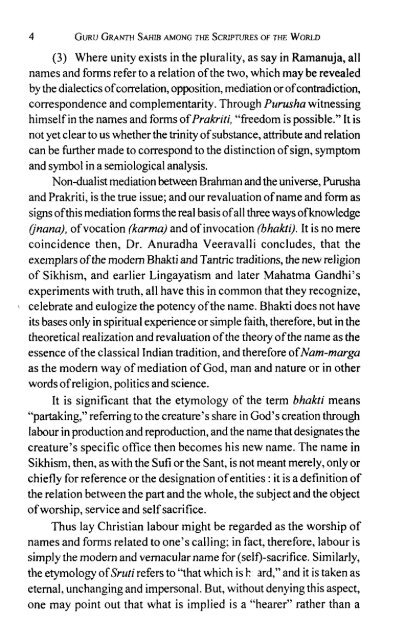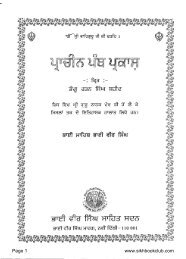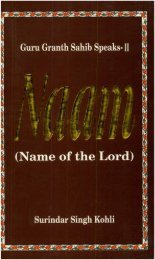Guru.Granth.Sahib.Am.. - Gurmat Veechar
Guru.Granth.Sahib.Am.. - Gurmat Veechar
Guru.Granth.Sahib.Am.. - Gurmat Veechar
Create successful ePaper yourself
Turn your PDF publications into a flip-book with our unique Google optimized e-Paper software.
4 GURU GRANTH SAHIB AMONG THE SCRIPTURES OF THE WORLD<br />
(3) Where unity exists in the plurality, as say in Ramanuja, all<br />
names and fonns refer to a relation ofthe two, which may be revealed<br />
by the dialectics ofcorrelation, opposition, mediation orofcontradiction,<br />
correspondence and complementarity. Through Purusha witnessing<br />
himselfin the names and fonns ofPrakriti, "freedom is possible." It is<br />
not yet clear to us whetherthe trinity ofsubstance, attribute and relation<br />
can be further made to correspond to the distinction ofsign, symptom<br />
and symbol in a semiological analysis.<br />
Non-dualist mediation between Brahman and the universe, Purusha<br />
and Prakriti, is the true issue; and our revaluation ofname and fonn as<br />
signs ofthis mediation fonns the real basis ofall three ways ofknowledge<br />
Onana), ofvocation (karma) and ofinvocation (bhakti). It is no mere<br />
coincidence then, Dr. Anuradha Veeravalli concludes, that the<br />
exemplars ofthe modern Bhakti and Tantric traditions, the new religion<br />
of Sikhism, and earlier Lingayatism and later Mahatma Gandhi's<br />
experiments with truth, all have this in common that they recognize,<br />
celebrate and eulogize the potency ofthe name. Bhakti does not have<br />
its bases only in spiritual experience or simple faith, therefore, but in the<br />
theoretical realization and revaluation ofthe theory ofthe name as the<br />
essence ofthe classical Indian tradition, and therefore ofNam-marga<br />
as the modem way ofmediation ofGod, man and nature or in other<br />
words ofreligion, politics and science.<br />
It is significant that the etymology of the tenn bhakti means<br />
"partaking," referring to the creature's share in God's creation through<br />
labour in production and reproduction, and the name that designates the<br />
creature's specific office then becomes his new name. The name in<br />
Sikhism, then, as with the Sufi orthe Sant, is not meant merely, only or<br />
chiefly for reference or the designation ofentities: it is a definition of<br />
the relation between the part and the whole, the subject and the object<br />
ofworship, service and selfsacrifice.<br />
Thus lay Christian labour might be regarded as the worship of<br />
names and fonns related to one's calling; in fact, therefore, labour is<br />
simply the modem and vernacular name for (self)-sacrifice. Similarly,<br />
the etymology ofSruti refers to "that which is r.. ard," and it is taken as<br />
eternal, unchanging and impersonal. But, without denying this aspect,<br />
one may point out that what is implied is a "hearer" rather than a

















